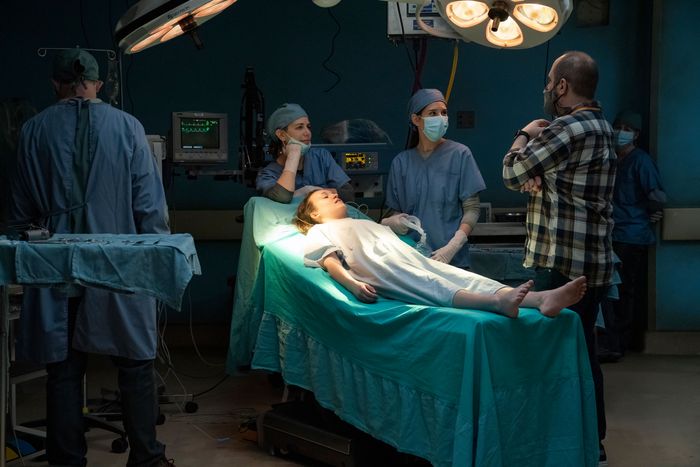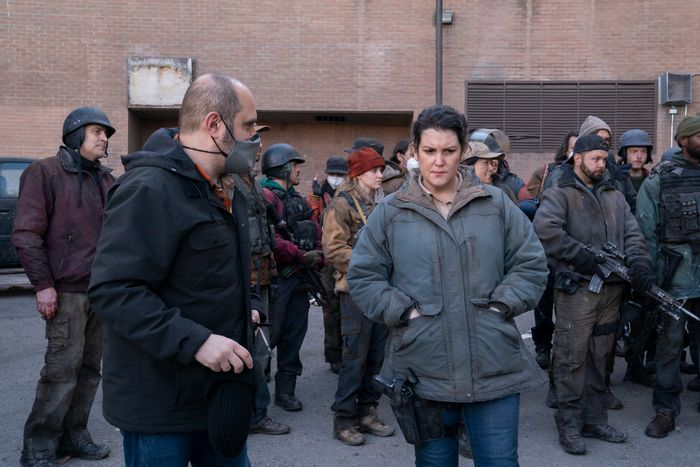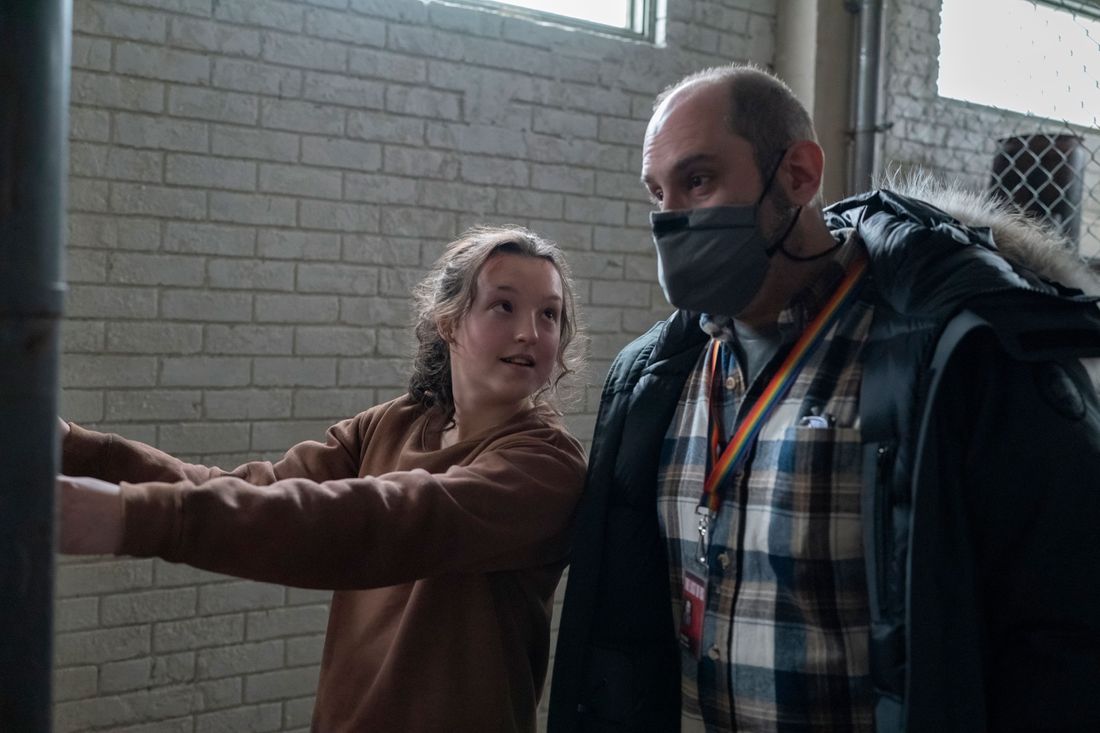
Spoilers follow for the season finale of The Last of Us, “Look for the Light.”
Craig Mazin will carry The Last of Us with him forever — literally. On the showrunner, writer, and director’s upper arm is his first tattoo: a rendering of Ellie’s switchblade, the weapon she inherited from her mother Anna through Anna’s close friend, resistance leader Marlene. Mazin and fellow showrunner Neil Druckmann, who co-created The Last of Us video game, made a pact to get matching ink “if the show was good, which we defined loosely,” Mazin says. By all measures, they succeeded: positive critical reviews, record-breaking viewership numbers for HBO, a second-season renewal. The only issue? Druckmann hasn’t gotten his tattoo yet.
“I am saying this to as many journalists and as many places as I can, because he gave me his word,” Mazin laughs.
That switchblade has primary placement in The Last of Us finale “Look for the Light,” which is bookended with scenes in which Ellie’s parental figures fight to protect her — first in a flashback, in which a laboring Anna spars with a Cordyceps-infected foe. She’s bit as she gives birth to her daughter and mercy-killed by Marlene, who takes Ellie to raise. Then Joel battles against a hospital full of Fireflies, killing as many as he can — including Marlene — to rescue Ellie, the daughter he’s come to see as his own. The latter is a fairly faithful adaptation of the Last of Us video game’s ending, which a decade ago sparked debate about its level of violence and arguable nihilism about the worthiness of saving the world. Mazin will soon start “clacking away” on the next season, but before then, he knows the events of “Look for the Light” will make people talk about love’s inherent irrationality. He’s ready to talk, too.
You’ve said you write to endings. How did you write to the Joel ending?
I had the gift of the source material. Even though it plays out differently because you’re playing the game, what I did want to say is, What is the opposite of Joel committing successive acts of violence to save this girl? That was in my mind when I was thinking about their first meeting, which in the show is different than in the game: He aims a gun right at her face. It’s violence that Joel does to Ellie because Ellie’s attempting to do it to Joel. Now, to see it once again culminating in violence, but in the opposite direction — to me, that’s the joy of drama. That’s watching somebody go from anti-theme to theme.
All of the story is about injury. They’ve been injured similarly and they’re gonna continue to be injured. This is the culmination. If this show ended with Joel saying, “It wasn’t time that did it,” and the two of them walk off into the sunset toward a brighter horizon, that would have been really nice. Because what is he saying there? You healed me, and I healed you, and now we can be father and daughter forever. The problem is, that’s not how it works. You can’t have everything you want without paying some kind of price, and Joel decides the price is worth it.
And it’s up to us to decide if it is or isn’t.
We can argue about it all day long, and we should. Good stories are not built on themes like “brotherhood” or “anger”; those are just words. Good stories are built on arguments: It’s worth killing everyone to save the person you love. We can debate that.
It was startling how excited people were for what they thought was going to happen when Ellie was caged up by David and Joel was coming to save her. They were so excited for him to murder everyone, but particularly David, because David is a character we don’t mind murdering. But Marlene? That’s an addition we put in the scene in the car as they’re driving away and Joel’s lying about what happened. We intentionally put in Ellie asking specifically about Marlene. We know more context than players did when they played the game because we added an additional scene in the beginning. How was Ellie born? The world’s worst Pietà of mother and child. Marlene becomes her mother of a kind. We made a joke about it — “What are you, my fucking mom or something?” Kinda! And Joel kills her in cold blood.
The season made me think of a quote from Italian Marxist Antonio Gramsci, who talked about “pessimism of the intellect and optimism of the will.” I go back and forth on the ending in the context of that quote. Is it pessimistic or optimistic to save one life instead of theoretically saving countless others? I can say, “Joel is a monster,” but it’s difficult to know whether I consistently perceive it that way.
It is certainly, by design, getting to this thing about us that we don’t like to acknowledge, which is that we’re not rational. Neither our will nor our optimism is rational. We just think they are. Ellie says to David, “You’re an animal,” and he says, “Well, we all are. That’s sort of the point.” Bingo. We’re just really smart monkeys. We behave in a way that is subrational. We are inventing rationality to account for irrationality.
Neil has said when they were testing the game, parents almost 100 percent of the time said, “He did exactly what he was supposed to do,” and a lot of times, people who weren’t said, “He’s a monster.” I’m a parent. I straddle the line. We cut a line out of episode five and I regret it. I wish I could put it back in. It was when Henry says to Joel, “I did a bad-guy thing.” There was an exchange where Joel says, “So you’re saying if you had to do it all over again, you wouldn’t?” and Henry says, “I’m saying if I had to do it all over again, I would try really hard not to. And then I probably would.” If I were in that situation as a parent, I would try really hard not to, but I probably would. If Joel walked away without regrets, if Joel walked away without shame, that would be different. Then I would say he’s a monster. But you don’t lie unless you know you’ve done something wrong.
You’ve previously used the term “hero” to describe Joel and Ellie. Would you still use it for Joel after the season finale?
Yes, but I don’t look at the word “hero” in the positive sense any more than I necessarily look at “villain” in the pejorative sense. “Protagonist” would be just as good of a word. The protagonist has goals, and the protagonist ultimately does or doesn’t achieve them. Joel achieves his goal — it’s just that we might not be onboard with it anymore, and that’s the discussion I think people are going to have. That’s always been a discussion around The Last of Us. It’s something that captivated me when I played the game for the first time. The story didn’t let me walk away clean. Yes, Joel is the hero, but we have to interrogate how we feel about our heroes. Heroes of the kind that we see in comic books, that’s bullshit. There’s no such thing.
I rewatched your previous TV project, the miniseries Chernobyl, and its central idea is “What is the cost of lies?” I’m wondering what you consider the cost of Joel’s lie to Ellie about what happened in the hospital.
I’m gonna adjust the question slightly: What is the cost of love? It’s so powerful; we give ourselves over to it. At the end of episode eight, Joel calls Ellie “baby girl” and she hugs him, and we understand that they love each other. We have been waiting for this moment for so long.
Love is behind the most extreme choices we make and the most extreme behaviors in which we engage. Do you love this person more than those people? Parents say things like this to their children all the time: “I love you more than the world itself.” Do you? For Joel, the answer is “Yes, I do.” That is profound, and the ambiguity of the positivity of love is what we should be taking forward. What Joel has done in the name of love is a selfish act but an understandable one. It is setting a chain of events in motion that will not be undone. If you look at any kind of intractable conflict between people or peoples, at some point you’re gonna find somebody doing something because of love. That love manifests as fear, hatred, xenophobia, racism, religious superiority. These things that start like little seeds grow into massive things that we can’t comprehend how to get out of.
We are invested in Joel. We don’t want him to lose the person he loves. What about all the people he kills? Who loves them? What if we were telling their story? It’s also about the power of narrative, which I’m obsessed with. This is very relevant to Chernobyl: We are constantly being manipulated by the power of narrative. What is the story we’re telling, and how does it make us feel? Who gets to tell the story? Are we willing to look on the other side? All advertising, all political campaigns, all social media, what we’re doing right now — journalism, critique — everything is narrativized. What does it mean for us as humans? There’s no easy answer.
I think about how what Kathleen was doing was out of love, and how we’re supposed to perceive that compared with what FEDRA did in Kansas City. There is this idea that love is the best thing we can do and also the worst.
Kathleen is an interesting case because she was the epitome of “love blind.” She was so blind to the fact that she was committing crimes out of this wound, the love of her brother, that she couldn’t see the irony of what she was saying to Henry. She’s not wrong — there are kids dying all the time. How many of the people around her lost kids or siblings? They’re not doing these things. She was able to point out to Henry that his singular focus on who he loved was not justifiable, but couldn’t see that her singular focus on whom she loved was also not justifiable. Meanwhile, the person listening to that conversation is Joel. We cut to him as she’s getting to the point. What’s relevant to him is, “Do you think one person is worth everything?” And the answer is no, unless it’s me and my person, and then the answer is yes. That’s the problem.
What appeals to you about destruction, disaster, and re-creation?
We don’t like thinking about it, but we are all decaying. Destruction and decay mirror our own process and the natural process of every living thing, and then in their place, there is a rebuilding. As we get older, there’s also a beauty to us. One of the things director Johan Renck and I would talk about on Chernobyl is the idea of “beautiful ugly.” Early on when Neil and I were talking with John Paino, our Last of Us production designer, it was about finding the beauty in decay. When we were talking with our visual-effects and prosthetics teams, it was, “How do we make these fungal creatures beautiful?” Fungus is the thing that ultimately devours us all, along with bacteria. They return us to the Earth. It’s weird that we struggle against it. I don’t want to look away from that, and I don’t want to either over-romanticize it or turn it into something horrifying. We ought to be looking at it with open eyes.
How did you decide which scenes need more from a TV perspective? I’m thinking about Tess’s death and the dialogue “save who you can save,” which is not in the video game.
In adaptation, we have the ability to change perspective. Video games are first-person. Even The Last of Us, which was somewhat revolutionary in the way it suddenly and jarringly switched perspective and had you play as Ellie, was mostly just, What does Joel see? Tess was experienced entirely through the lens of Joel. But there’s a difference between Joel and Tess, and it starts to emerge after Ellie wakes up. We talked about the idea of Tess being a mother — what is the difference between a mother who loses a child and a father who loses a child? The idea was that maternalism maintains hope because mothers make humans. When I say “make,” I mean carry them and give birth to them; men don’t. [Pauses.] I’m using the cisgender heteronormative terms, I apologize. I have a trans member of my family who’s gonna get on me for that, so I apologize to her and to everybody. I’m still learning.
My point is, there is this spark of hope. Tess’s maternalism is awoken, and she actually gets angry at Joel for not buying in. That mother thing kicks in. It isn’t, I’m gonna kill everybody to keep this kid alive. What she’s saying to Joel at the end is, “Be positive, and deliver a child to the world.” That came out of our discussions, trying to dig under the hood of every character and providing the actors with as much as you can. What’s nice is, I didn’t say any of that to Anna Torv. She got it. She just knew.
You’ve said, “I’m not interested in the zombies.” The back half of this season, past the Kansas City outbreak, is —
Relatively zombie-free.
Was anyone saying, “Maybe we should have more Infected?”
No. Neil and I worked very hand in hand. In the game, when Ellie meets David, they are immediately attacked by Infected because you have to have gameplay. There’s an argument for doing it there — it certainly helps this sense of binding between the two of them, but that trust is obliterated very quickly thereafter. Then the question is, Where did those Infected come from and why now? In the game, you don’t ask that question. You bought a game to play it; you want them to show up so you can do something. Well, we’re nothing but cutscenes. To people who are like, “I wish there were more,” I say, “Good,” because it means you liked what we did with them. As the series goes on, there will probably be times where you’ll say, “I wish there were fewer” — but only because you’re dreading it. What we’ll never do is the scene where it’s like, “Ah, fuck! Bunch of Infected, let’s just kill them.” It will always be worse than that.
Season one was a 200-day shoot. What have you learned that you’re taking into season two?
When people say, “There should have been five more episodes,” I’m like, “You don’t understand. I almost died.” [Laughs.] I was there every day. The only break I took other than the hiatus for the holidays was three weeks while Neil was shooting his episode. There was one day I worked on eight different episodes because of writing, editing, approving visual effects, prepping, and shooting. I fell apart a few times. I don’t fall apart for long — it’s usually an evening — but I got used to drowning. One of my hopes for this upcoming season is to write less during production and make sure the things I now know will take a lot of time get that time — visual effects in particular.
There is an industrywide crisis in visual effects that people aren’t talking about, and they need to. The explosion of content times the amount of effects inside all of the content has created an impossible situation. There’s more work than there are visual-effects artists. The artists out there are working insane amounts of time. There’s an incredible amount of pressure on them, the companies, the people who are working with the companies on our end of things. I make myself watch the credits and I can’t believe how many names of people I’ll never meet put their lives on the line for me and the show. We have to figure out how to take care of everybody. The system can’t keep going like this. It’s gonna break.
When I talk to people who have played the game, everyone mentions the giraffe scene. What does it mean to you, and what do you want it to mean to viewers?
The purpose was to present it as it was in the game to an audience who has never played the game. Because it’s gorgeous. It’s also not particularly interactive in the game — you’re watching it. Ellie lost her innocence; she has killed not to save somebody but rather out of this horrible rage. She’s not who she was anymore. When she sees the giraffe, it’s a moment where Joel can help her reconnect with something beautiful. It’s where she starts to be okay. What I liked is how we built on it. There was this moment we set up all the way back in episode three that was apparently innocuous: “How’d you get that scar?” That’s what comes back here: “I was the guy who shot and missed.” In sharing his trauma with her — and she’s obviously smart enough to know why — he completes the promise of that giraffe scene.
From a narrative point of view, it is incredibly meaningful and true that we heal each other, but ultimately, it is not dramatically provocative. What happens if the only way to heal somebody is to hurt someone else? People are gonna have interesting discussions after the episode concludes. People may be angry at the show, may be angry at Joel. They may be angry at people who are angry at Joel. People felt strong emotions about the game, and people will hopefully continue to feel strong emotions about the show.
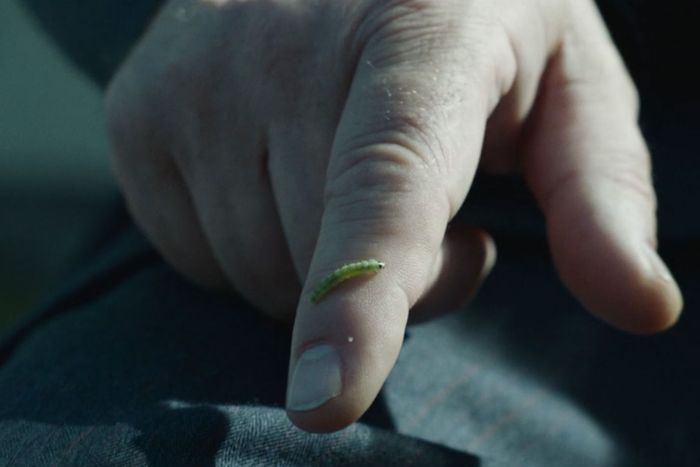
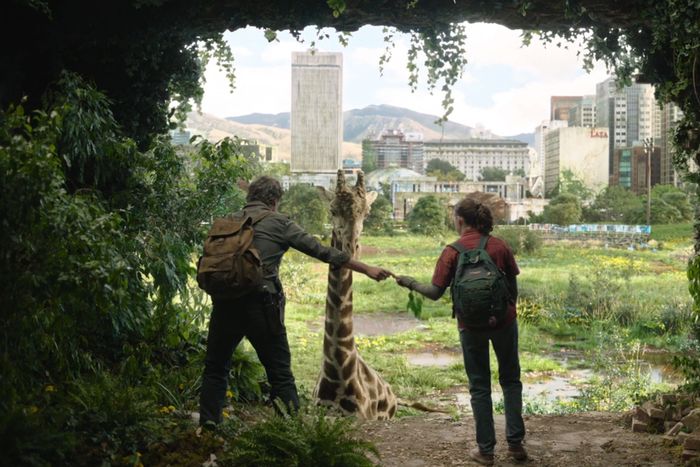
To me, the giraffes were this show’s version of the green-inchworm scene from the Chernobyl finale. That moment is beautiful, but there’s still a shit-ton of death that comes after it.
Just like in real life.
This interview has been edited and condensed for clarity.
More From This Series
- The Last of Us Reminds Us It’s In Fact a Scary Show
- 68 TV Shows We Can’t Wait to See in 2025
- So … What Will the 2025 Emmys Look Like?



